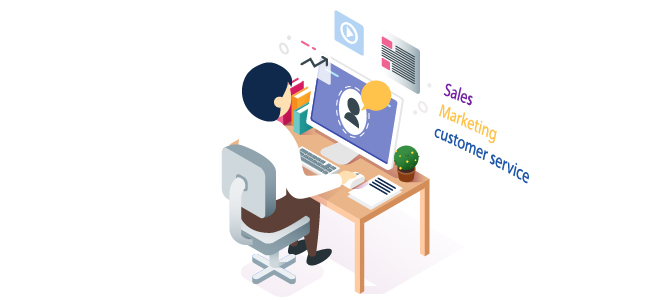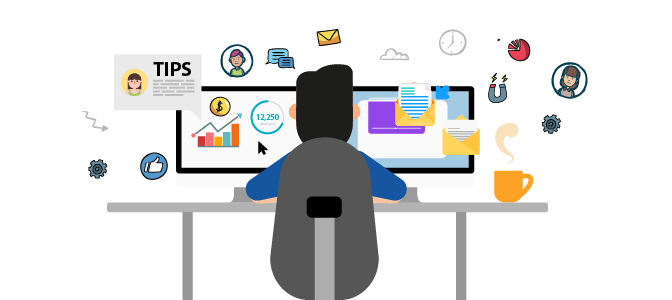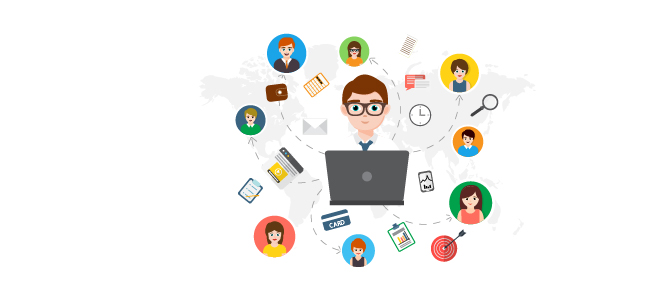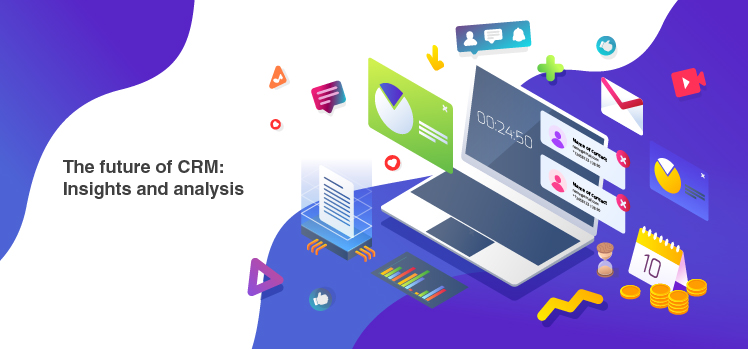The future of CRM: Insights and analysis
When you hear the term customer relationship management (CRM), you probably think about CRM software. But the concept of CRM is larger than the software that companies use to manage relationships. Customer relationship management also includes interpersonal interactions with customers that take place in person or outside of your CRM solution.
For a host of reasons, CRM is in a state of rapid evolution and transition. The days when companies used CRM software to interact with every customer, in the same way, are over. Over the next few years, you can expect to see significant changes in CRM software and how businesses use it.
It’s advantageous to look forward and anticipate these changes so you can stay ahead of the curve. Below we cover the key changes to CRM that you can expect to see in the future.
Customer insights and data will drive better customer relationships
The CRMs of today can capture and store immense amounts of customer data, from their birthday to their favorite color of t-shirts. You can use this data in advanced analytics or for training AI/ML algorithms in a responsible way by generating synthetic data from the privacy sensitive CRM data for downstream tasks..
You’ll increasingly see companies leveraging this data to form more personal relationships with their customers. This will result in a better customer experience, higher levels of engagement, and increased customer loyalty.
CRM will facilitate the alignment of sales, marketing, and customer service

Businesses increasingly realize that they need to align the efforts of their sales, marketing, and customer service, help desk teams. When each team is working in a different system and data is stored in silos, each team has a different perspective of who each customer is.
Integrating those various systems so all teams can work off one source of data truth will help align how each team views each customer. It will also improve collaboration and help you deliver a consistent customer experience in which everyone speaks to customers in the same way, from the same perspective.
More customer engagement and retention initiatives
Customer retention is incredibly important to every business. It costs at least five times more to acquire a new customer than retain an existing one. Businesses are catching on, and customer engagement and retention initiatives are growing in popularity.
You can expect to see more companies using their CRM solution to automate these programs. Plus, it’s likely that new features will be added to CRM systems to facilitate this.
Nurturing brand advocates will become increasingly important
Brand advocates—also known as brand ambassadors—are people who love your product and recommend it to their friends and family. People trust recommendations from friends and family much more than the information they read online.
Customer relationship management will increasingly focus on identifying and nurturing brand advocates. Social listening tools will continue to evolve and be integrated into CRM software. This will improve your ability receive an alert the moment someone mentions you on social media. That’s the perfect opportunity to engage a potential brand advocate.
The competition will continue to increase
The number of companies that develop CRM software has skyrocketed over the past few years. And we can expect this to continue.
What does that mean?
- Costs have been dropping and will continue to do so
- Lower costs will make it much easier for a company to switch to another CRM provider
- With so many cheap options available, providers will have to work harder to retain customers
- Customer satisfaction initiatives will become commonplace to prevent churn
CRM software will continue to become more intuitive and user-friendly

In the early days of CRM software, systems were clunky and overly complex. They required extensive training to manage the system effectively. However, CRMs have become much more user-friendly.
Drag and drop interfaces are becoming the norm. As systems become more intuitive, the training needed will continue to decline, and the learning curve will become shorter.
This is great for users, but also means that providers will need to focus even more on training users to leverage the system to its full capacity. Because a shorter learning curve also makes it easier for customers to switch providers if they are not satisfied.
CRM providers will hire top talent to manage onboarding
It’s all too common that a CRM onboarding and training specialist follows the same process for onboarding all customers. The problem with that is every business is different and needs to be trained in a unique way. And this type of one-size-fits-all onboarding results in lower levels of usage, which increases customer churn.
CRM providers will look to hire more top talent to fill those onboarding specialist roles. Those specialists will need to take the time to ask questions and fully understand the specific use case and business strategy of new customers. They will have to have an extensive understanding of various industries, so they can ask the right questions and train new users on how to use the system according to their needs.
Hiring employees who can do this will result in higher levels of usage and will ensure that each customer is successfully using their CRM software and receiving the maximum return on their investment.
All-in-one CRMs will continue to gain market share

The all-in-one CRM is a fairly new concept. Because teams have been working in different systems and maintaining different data sets in silos, CRM providers have begun to incorporate the functionality of those other solutions into the core CRM system.
An all-in-one CRMs include traditional CRM capabilities, as well as sales enablement, marketing automation, and help desk modules all on the same platform. This saves loads of time, reduces costs incurred by customers, and helps align your teams around common business goals.
All-in-one CRMs also improves data quality and your teams’ ability to deliver a consistent customer experience. With one source of data truth, everyone is on the same page and can work smarter and more effectively.
Integrations will allow companies to do even more in the same system
Many CRMs already come with built-in options to integrate with various third-party applications. This allows users to complete even more tasks in the same system. When a business uses an all-in-one CRM and incorporates integrations and plugins, they can complete nearly every business function in the same system.
This saves users loads of time as they don’t have to constantly switch between apps to complete different tasks. Moreover, any application that is not included in your CRM’s integration options can be integrated with the help of Zapier.
The key takeaway here is that companies realize they need to be able to maintain a view of the entire customer journey, from generating new leads to ensuring customer support keeps them satisfied. And an all-in-one CRM combined with integrations allows businesses to do that.
Personalization will become more important and easier
With all the data you are now able to store about each individual customer, personalization is becoming easier—particularly personalization in marketing. You can expect to see new features added to CRM solutions that make personalization even easier—it’s an inevitable aspect of the future of CRM.
That is good news because consumers increasingly expect a personalized customer experience. A one-size-fits-all approach is becoming less effective, and personalization is taking over.
Artificial intelligence and machine learning won’t be as integral as many predict

Artificial intelligence (AI) and machine learning (ML) are hot topics these days. And yes, I know many predict that CRM providers will rapidly incorporate them into their solutions. However, I’m going to disagree here.
AI and ML still have a long way to go before they become more useful than the automation that CRMs already provide. The technology will eventually get to the point where it meets expectations, but that won’t happen as soon as many predict.
A few years ago, Salesforce introduced Einstein, an AI, and ML add-on to their CRM platform. However, it wasn’t as successful as they had hoped. There was a lot of hype about its release, followed by a significant amount of disappointment.
This quote by Danielle DeLozier, global product owner at Michelin, sums it up perfectly:
“AI is not as proven as some of the [other] features Salesforce has,” DeLozier said. “When working with the business, it has been a challenge to prioritize this initiative over things we know work.”
Social CRM will continue to grow
Social CRM refers to the act of managing customer relationships through social media channels. Social media usage continues to grow every day. This will continue as millennials overtake baby boomers as the largest consumer demographic.
Many CRM solutions already have built-in social CRM capabilities. They help you monitor social channels for brand mentions so you can respond as quickly as possible and engage potential customers. You can use social CRM features to schedule posts, manage customer complaints posted on social media sites, engage potential customers, and more.
Plus, some CRMs offer the ability to use social CRM capabilities for lead generation. For example, Agile CRM allows you to integrate with LinkedIn, find a lead that looks like a good fit, and automatically pull their information into your CRM database. Social CRM is on the rise, and you can expect CRMs to incorporate more features that facilitate it into their products.
Conclusion
If you take away just one lesson from this article, it is that the future of CRM will revolve around the customer and their needs. CRM software providers will introduce new features that allow end users to leverage CRM software to improve the customer experience.
With so much competition and prices dropping, it will be imperative that businesses can use their CRM solution to keep customers engaged, satisfied, and loyal. CRM software providers realize this and are already making plans to evolve their systems to facilitate a better customer experience.
Time will tell if all these predictions pan out. But the consensus from industry experts is that these changes will take place and transform CRM software and how businesses use it to keep customers happy.
Do you have a prediction about the future of CRM and its evolution? Share it with us in the comments section below!

No Comments